
Warning: Undefined variable $post in /var/www/html/rc-ecampus.ecampusontario.ca/wp-content/themes/ecampusontario/functions.php on line 183
Warning: Attempt to read property "ID" on null in /var/www/html/rc-ecampus.ecampusontario.ca/wp-content/themes/ecampusontario/functions.php on line 183
5 min. Read
Enabling collaboration, upskilling for Ontario health-care workers
Collaborative skills are essential for professionals working with Ontario’s growing senior population, a demographic often needing complex or long-term care. Increasing access to programs that not only teach health care, but communication, collaboration and problem-solving is crucial. Flexible, fully-online programs for in-practice professionals or learners in rural areas provide this access.
To solve these challenges, a group of educators and professionals from George Brown College (GBC), the Centre for Learning, Research & Innovation in Long-Term Care at Baycrest Health Sciences (Baycrest), and Ryerson University teamed up with support from eCampusOntario to create such a program. Paula Mastrilli, Chair of the Sally Horsfall Eaton School of Nursing at GBC and project co-lead, explains the benefits of the new collaborative, post-graduate Interprofessional Certificate in Complex and Long-Term Care.
“This provides a very structured opportunity for all health-care providers to come together in a unique way. It’s accessible, so learners don’t necessarily need to be on site, on campus, to have that education delivered to them. It offers terrific opportunity for them to work together, to learn from each other, and to work towards that same common goal – to have excellent patient care. It’s so important, the literature supports it, government mandates and competency frameworks are saying that interprofessional care is a must.”
One program, multiple skills
The certificate is aimed at a variety of practitioners, including personal support workers, nurses, fitness specialists, dental professionals, hearing specialists and more. To comply with Ontario’s Certificate III parameters, it consists of 600 hours of course work – delivered online – and a capstone field practice placement in the learner’s local community or place of employment.
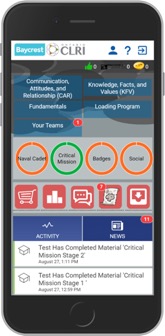
The certificate consists of seven courses, two taken from the existing GBC curriculum and two from the Gerontology program at Ryerson. Additionally, three new courses were created, two of which were based on objectives and content from workshops held by the Ontario Centres for Learning, Research and Innovation in Long-Term Care at the Baycrest Health Centre site.
In the program, learners move through different activities that focus on multimodal delivery and engagement, such as viewing micro lectures, readings and participating in social board discussions. They must also collaborate to solve dynamic “cases,” much the way they would in real life.
Jennifer Reguindin, an interprofessional educator at Baycrest and project co-lead, explains how the program’s Virtual Learning Space (VSL) makes high-impact, case-based learning possible. “For example, to create contexts around responsive behaviours for clients who have dementia, we set real life scenarios in which a whole group, an interprofessional team, would be required to solve a case. If you’re not able to solve a case by yourself, whether it’s in the acute changes course or the responsive behaviours course – you need help from others. As it draws from everybody’s expertise, the case elevates everybody as a very important member of the team. So, a lot of the activities and engagement and evaluation that are in the courses are grounded in interprofessional activities.”
The certificate enables “laddering,” meaning credits earned in this certificate can be used toward other programs, such as GBC’s Practical Nursing program or the Gerontology Certificate offered through Ryerson’s Chang School of Continuing Education.
Using technology to make space and accelerate upskilling
Wendy Ellis, Chair of the Sally Horsfall Eaton School of Nursing at GBC and project co-lead explains that space, location and time are key barriers to delivering quality health-care education. “Delivering education in the virtual space makes education accessible to all,” she says. “Where we’re located, it’s very expensive to have space, so the innovative way that we are delivering this particular certificate is going to address that concern. We’re in a position where physical growth is not necessarily an opportunity, so we have to think of different ways to grow, to meet the need for a certificate that can help to improve the health of Ontarians.”
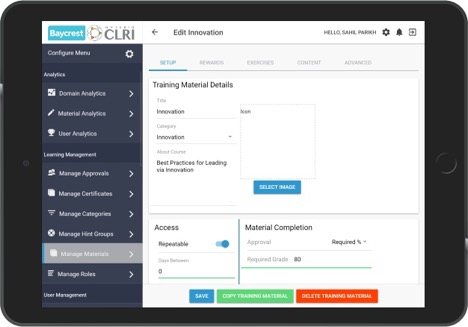
Simply making the program easier to access by removing barriers of the physical classroom, however, is not the only benefit of digital learning. In seeking feedback through beta testing and an online survey with ten interprofessional interns, the development team found that all respondents felt the VLS medium that delivered “virtual” cases increased their ability to think critically.
With these benefits in mind, the project team is exploring the option of using the certificate’s VLS model – which is essentially an app – in other programs, like the practical nursing diploma or personal support worker program.
According to Raquel Meyer, Manager of the Ontario Centres for Learning, Research & Innovation in Long Term Care at Baycrest and co-project lead, “It [the VLS] could be used in undergraduate programs to augment clinical placements, it could be used by the staff in long-term care to expose them to particular types of cases, as well as contexts. So it has multiple uses.”
This project is just one example of eCampusOntario’s dedication to supporting institutions as they leverage tech-enabled learning to create innovative new learning spaces while responding to the needs of an evolving workforce.
Project Leads
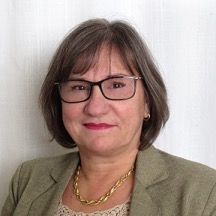
Paula Mastrilli,Chair of the Sally Horsfall Eaton School of Nursing at GBC
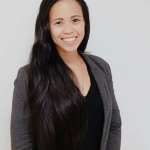
Jennifer Reguindin, interprofessional educator at Baycrest Health Sciences

Wendy Ellis, Chair of the Sally Horsfall Eaton School of Nursing at GBC
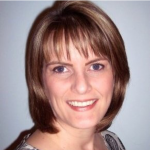
Raquel Meyer, Manager, Ontario Centres for Learning, Research & Innovation in Long Term Care at Baycrest Health Sciences

Jane Mosley, Nursing professor at GBC and the University of Toronto

Dalia Hanna, Program Director, Community Services, Chang School of Continuing Education at Ryerson University
Do you have an eCampusOntario-supported project you would like to see featured? Contact us today.



